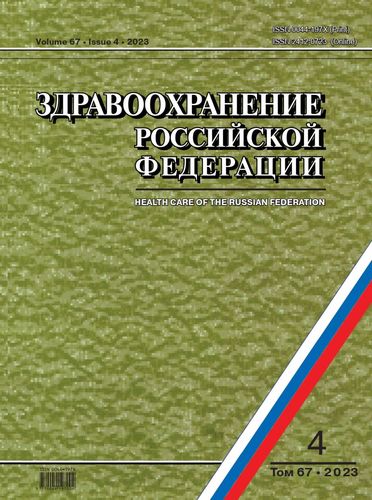The Legal Regime of Anti-Crisis Regulation in the Healthcare
- 作者: Tsomartova F.V.1
-
隶属关系:
- The Institute of Legislation and Comparative Law under the Government of the Russian Federation
- 期: 卷 67, 编号 4 (2023)
- 页面: 329-335
- 栏目: MEDICINE AND LAW
- ##submission.dateSubmitted##: 25.10.2024
- URL: https://hum-ecol.ru/0044-197X/article/view/637844
- DOI: https://doi.org/10.47470/0044-197X-2023-67-4-329-335
- EDN: https://elibrary.ru/uzvpoa
- ID: 637844
如何引用文章
全文:
详细
Introduction. The understanding of crisis situations in many of their varieties, including those affecting the health of the population, is shifting from temporary and exceptional one-time events to long-term processes that pose serious challenges to the rule of law and require an adequate legal response. Under such circumstances, the usual health regulators, designed for the normal state of social relations, turn out to be non-functional. In this regard, the problem of scientific development of a special legal mechanism for anti-crisis management aimed at preventing, ensuring preparedness, effective response and liquidation of the consequences of crisis situations in the healthcare sector is being actualized.
Materials and methods. The methodological basу of the study included general scientific (dialectical, logical, systemic, historical, sociological, statistical), and private scientific methods of legal science (formal legal, historical legal and comparative legal). The empirical base of the study was domestic and foreign legal acts, law enforcement practice, and legal doctrine.
Results. There were identified and characterized,main features of the legal mechanism of anti-crisis management in the healthcare sector including the interdependence of risks in the healthcare sector and the need for a comprehensive regulatory impact on them, the normalization of anti-crisis regulation of the health of citizens, some dejuridization of the industry, a change in the ratio of individual and public interests, acceleration digitalization and intensification of legal experiments in healthcare.
Limitations. Due to the objective novelty of the problem under consideration the study is somewhat limited in terms of reviewing the reports on the relevant topic.
Conclusion. In modern conditions of permanent instability, there is a tendency to form the so-called anti-crisis standard for protecting the health of citizens as a special comprehensive intersectoral perpetual legal regime adapted to exceptional threats to the life and health of citizens.
Compliance with ethical standards. The study does not require submission of the opinion of the biomedical ethics committee or other documents.
Acknowledgment. The study had no sponsorship.
Conflict of interest. The authors declare no conflict of interest.
Received: October 05, 2022
Accepted: December 15, 2022
Published: August 30, 2023
作者简介
Fatima Tsomartova
The Institute of Legislation and Comparative Law under the Government of the Russian Federation
编辑信件的主要联系方式.
Email: social3@izak.ru
ORCID iD: 0000-0001-9486-9900
The Institute of Legislation and Comparative Law under the Government of the Russian Federation, Moscow, 117218, Russian Federation.
e-mail: social3@izak.ru
俄罗斯联邦参考
- Khabrieva T.Ya. Law based managing the pandemic crisis: world and Russian experience. Zhurnal rossiyskogo prava. 2021; (2): 5–17. https://doi.org/10.12737/jrl.2021.015 https://elibrary.ru/voynks (in Russian)
- Albert R., Roznai Y., eds. Constitutionalism under Extreme Conditions: Law, Emergency, Exception. Cham: Springer; 2020.
- Auriel P., Beaud O., Wellman C., eds. The Rule of Crisis: Terrorism, Emergency Legislation and the Rule of Law. Cham: Springer; 2020.
- Schwab K., Malleret T. COVID-19: The Great Reset. Geneva; 2020.
- Tsomartova F.V. Social payments in health care. In: Antonova N.V., ed. Social Payments in the Russian Federation: Intersectoral Approach to Legal Regulation [Sotsial’nye vyplaty v Rossiyskoy Federatsii: mezhotraslevoy podkhod k pravovomu regulirovaniyu]. Moscow; 2021: 106–34. (in Russian)
- Emel’yanov A.S., Efremov A.A., Kalmykova A.V. Digital Transformation and Public Administration: Scientific and Practical Guide [Tsifrovaya transformatsiya i gosudarstvennoe upravlenie: nauchno-prakticheskoe posobie]. Moscow: Infotropik; 2022. (in Russian)
- Khabrieva T.Ya., Tikhomirov Yu.A., eds. Draft Federal law «On normative legal acts in the Russian Federation». Moscow; 2021. (in Russian)
- Umnova-Konyukhova I.A., Aleshkova I.A., Lez’er V.A. Legal regimes and permissible limits of restriction of rights and freedoms: a comparative analysis of the legislation of Russia and France. Sotsial’nye i gumanitarnye nauki. Otechestvennaya i zarubezhnaya literatura. Seriya 4: Gosudarstvo i pravo. 2022; (1): 135–52. https://doi.org/10.31249/rgpravo/2022.01.11 https://elibrary.ru/esmtnx (in Russian)
- Nikitina E.E. The system of human rights and freedoms in the context of the technological revolution. Zhurnal rossiyskogo prava. 2020; (8): 27–44. https://doi.org/10.12737/jrl.2020.092 https://elibrary.ru/sxeept (in Russian)
- Varlamova N.V. Third generation of human rights? Rossiyskiy yuridicheskiy zhurnal. 2011; (2): 9–18. https://elibrary.ru/nlqpxv (in Russian)
- Khabrieva T.Ya., Klishas A.A. Thematic commentary to the Law of the Russian Federation on the Amendment to the Constitution of the Russian Federation of March 14, 2020 № 1-FKZ «On improving the regulation of certain issues of the organization and functioning of public authorities». Moscow; 2020. (in Russian)
- Khabrieva T.Ya., ed. Commentary on the Constitution of the Russian Federation (article by article): with account of the amendments approved by the all-Russian vote on July 1, 2020. Moscow; 2021. (in Russian)
补充文件








